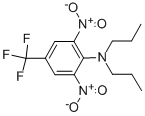| Identification |
| Name: | trifluralin |
| Synonyms: | alpha,alpha,alpha-trifluoro-2,6-dinitro-N,N-dipropyl-p-toluidine; Trifurex; TRIFLUREX; trilin 4ec; Trifiuralin; treflam; TREFLAN; TREFLAN(R) |
| CAS: | 1582-09-8 |
| EINECS: | 216-428-8 |
| Molecular Formula: | C13H16F3N3O4 |
| Molecular Weight: | 335.28 |
| InChI: | InChI=1/C13H16F3N3O4/c1-3-5-17(6-4-2)12-10(18(20)21)7-9(13(14,15)16)8-11(12)19(22)23/h7-8H,3-6H2,1-2H3 |
| Molecular Structure: |
 |
| Properties |
| Transport: | UN 2588 |
| Density: | 1.294 |
| Stability: | Shelf life of concentrate is more than 2 yr stable in pure state, in liquidor in granular formulations stable though susceptible to decomposition by ultraviolet radiation. |
| Refractive index: | 1.527 |
| Water Solubility: | | <0.01 g/100 mL at 22.5 ºC |
| Solubility: | <0.01 g/100 mL at 22.5 oC in water |
| Appearance: | Yellow-orange crystalline solid |
| Specification: |
usageEng:Pre-emergence herbicide used for grass control in crops.
Safety Statements:2-24-37-60-61-36-26-16
2:Keep out of the reach of children
24:Avoid contact with skin
37:Wear suitable gloves
60:This material and/or its container must be disposed of
as hazardous waste
61:Avoid release to the environment. Refer to special instructions
safety data sheet
36:Wear suitable protective clothing
26:In case of contact with eyes, rinse immediately with plenty
of water and seek medical advice
16:Keep away from sources of ignition - No smoking |
| Report: |
NCI Carcinogenesis Bioassay (feed); Clear Evidence: mouse NCITR* ?? National Cancer Institute Carcinogenesis Technical Report Series. (Bethesda, MD 20014) No. NCI-CG-TR-34 ,1978. ; No Evidence: rat NCITR* ?? National Cancer Institute Carcinogenesis Technical Report Series. (Bethesda, MD 20014) No. NCI-CG-TR-34 ,1978. . EPA Genetic Toxicology Program. Community Right-To-Know List.
|
| Color: | Yellow crystals
YELLOW-ORANGE PRISMS |
| Usage: | Herbicide. |
| Safety Data |
| Hazard Symbols |
 Xi:Irritant
Xi:Irritant
|
| |
 |